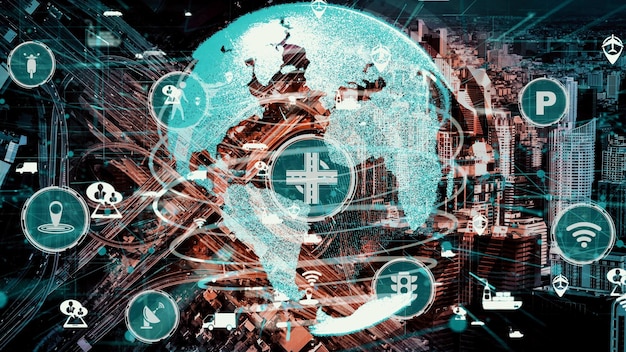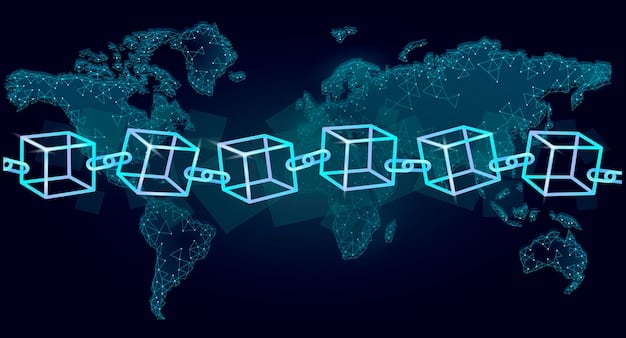Unlock Your Future: Blockchain Skills Beyond Cryptocurrency

Blockchain Technology Beyond Cryptocurrency: New Skills for Diverse Industries is revolutionizing sectors beyond finance, creating demand for professionals with expertise in distributed ledger technology, smart contracts, and decentralized applications.
The world of blockchain is expanding far beyond its initial association with cryptocurrencies. While Bitcoin and other digital currencies brought blockchain to the forefront, the technology’s potential reaches into countless industries. Understanding Blockchain Technology Beyond Cryptocurrency: New Skills for Diverse Industries is now crucial for professionals seeking to remain competitive and innovative in an evolving job market. This article explores the diverse applications of blockchain and the skills needed to thrive in this exciting new landscape.
Exploring Blockchain Technology Beyond Cryptocurrency: New Skills for Diverse Industries
Blockchain technology’s transformative power extends across numerous sectors, making it essential to understand its applications beyond cryptocurrency. From enhancing supply chain transparency to revolutionizing healthcare data management, blockchain is driving innovation and efficiency. Let’s delve into the skills and opportunities this technology unlocks.
Blockchain in Supply Chain Management
Blockchain’s ability to provide a secure and transparent ledger makes it ideal for tracking goods and materials through complex supply chains. This ensures authenticity, reduces fraud, and improves overall efficiency.
- Enhanced Transparency: Track products from origin to consumer, ensuring authenticity and ethical sourcing.
- Reduced Counterfeiting: Verify the legitimacy of products, minimizing the risk of counterfeit goods entering the market.
- Improved Efficiency: Streamline processes, reduce delays, and optimize logistics through real-time tracking.
- Increased Trust: Build trust with consumers by providing verifiable information about a product’s journey.

Blockchain in Healthcare
Securing and sharing medical data is critical in healthcare. Blockchain offers a decentralized, secure solution for managing patient records, clinical trials, and pharmaceutical supply chains.
- Secure Data Management: Protect patient data with cryptographic security, ensuring privacy and compliance.
- Interoperability: Facilitate seamless data sharing between healthcare providers, improving patient care coordination.
- Clinical Trial Integrity: Enhance the transparency and reliability of clinical trial data, reducing fraud.
- Pharmaceutical Supply Chain: Track and verify the authenticity of medications, preventing counterfeit drugs from reaching patients.
In conclusion, the application of blockchain in supply chain management and healthcare demonstrates its versatility. These use cases highlight why mastering Blockchain Technology Beyond Cryptocurrency: New Skills for Diverse Industries is crucial for professionals seeking innovative solutions in these areas.
The Rising Demand for Blockchain Professionals
As blockchain adoption grows, so does the demand for skilled professionals who can implement and manage these technologies. Understanding the specific roles and skills needed is key to entering this rapidly expanding field.
Key Blockchain Job Roles
Several distinct roles are emerging within the blockchain space. Each requires a unique set of skills and knowledge to contribute effectively to blockchain projects.
- Blockchain Developer: Designs, develops, and tests blockchain-based applications and smart contracts.
- Blockchain Architect: Creates the overall structure of blockchain systems, ensuring scalability, security, and performance.
- Blockchain Consultant: Advises organizations on the best ways to implement blockchain solutions to meet their specific needs.
- Blockchain Project Manager: Oversees the entire lifecycle of blockchain projects, ensuring they are delivered on time and within budget.
Essential Skills for Blockchain Professionals
To succeed in these roles, several essential skills are needed. These skills cover both technical knowledge and soft skills required to collaborate effectively.
- Cryptography
- Smart Contract Development
- Data Structures and Algorithms
- Decentralized Application (DApp) Development
- Understanding of Consensus Mechanisms

The demand for blockchain professionals is evident in the increasing number of job postings and higher salaries offered for these roles. Acquiring these essential skills is a valuable investment. Understanding Blockchain Technology Beyond Cryptocurrency: New Skills for Diverse Industries is crucial for seizing these opportunities and innovating in the tech space.
Developing Essential Blockchain Skills
Acquiring the necessary skills to thrive in the blockchain industry requires a combination of formal education, online courses, and hands-on experience. There are many different paths to learning the world of blockchain, and becoming proficient in blockchain development.
Online Courses and Certifications
Many reputable online platforms offer courses and certifications to help individuals develop the skills needed for blockchain development and implementation. These courses often cover a range of topics, from basic concepts to advanced techniques.
- Coursera: Offers courses on blockchain fundamentals, smart contract development, and decentralized finance (DeFi).
- Udemy: Provides a wide variety of blockchain courses, ranging from beginner to advanced levels.
- edX: Partners with universities to offer courses on blockchain technology and its applications.
Hands-On Projects
The best way to learn blockchain is by doing. Working on hands-on projects allows you to apply your knowledge and gain practical experience.
- Develop a Smart Contract: Create a simple smart contract for token issuance or voting.
- Build a DApp: Develop a decentralized application for a specific use case, such as supply chain tracking or healthcare data management.
- Contribute to Open Source Projects: Participate in existing blockchain projects, gaining experience working with experienced developers.
In conclusion, developing essential blockchain skills requires a multifaceted approach. With the right balance of education and experience, anyone can learn Blockchain Technology Beyond Cryptocurrency: New Skills for Diverse Industries. By choosing the right resources, you can develop the skills needed to succeed in the blockchain job market.
Blockchain Beyond Finance: Transforming Diverse Industries
While blockchain initially gained traction in the financial sector, its applications now extend far beyond cryptocurrency. Various industries are leveraging blockchain technology to enhance efficiency, security, and transparency. Let’s explore some prominent examples.
Supply Chain Enhancements
By providing a transparent and immutable ledger, blockchain revolutionizes supply chain management. This enables tracking products from origin to delivery, ensuring authenticity and reducing fraud.
- Tracking and Tracing: Monitor the movement of goods in real-time, reducing delays and improving logistics.
- Provenance Tracking: Verify the origin and authenticity of products, combating counterfeiting.
- Smart Contracts for Automation: Automate processes such as payments and quality control, reducing errors and improving efficiency.
Healthcare Data Management
Blockchain offers a secure and decentralized solution for managing patient data. This ensures privacy, interoperability, and integrity of medical records.
- Secure Data Sharing: Facilitate seamless data sharing between healthcare providers, improving patient care coordination.
- Clinical Trial Transparency: Enhance the reliability of clinical trial data by ensuring transparency and auditability.
- Pharmaceutical Supply Chain Security: Track and trace medications to prevent counterfeit drugs from reaching consumers.
From supply chain to healthcare, businesses are realizing the potential of Blockchain Technology Beyond Cryptocurrency: New Skills for Diverse Industries. This is because it drives a transformative revolution across many industries. Whether it is smart contracts, enhanced transparency, or improved security, blockchain creates solutions that traditional methods cannot accomplish.
The Future of Blockchain Skills and Industry Growth
The blockchain industry is poised for significant growth in the coming years, with numerous opportunities for skilled professionals. Understanding the trends shaping the industry and the evolving skill sets required is essential for future success.
Emerging Trends in Blockchain Technology
Several key trends are shaping the future of blockchain technology, including the growth of decentralized finance (DeFi), the rise of non-fungible tokens (NFTs), and the increasing focus on scalability and interoperability.
- Decentralized Finance (DeFi): DeFi platforms are disrupting traditional financial services by offering decentralized lending, borrowing, and trading solutions.
- Non-Fungible Tokens (NFTs): NFTs are revolutionizing the art, gaming, and collectibles industries by providing a way to represent unique digital assets on the blockchain.
- Scalability Solutions: New blockchain protocols and technologies are being developed to address scalability challenges and improve transaction speeds.
Adapting Your Skill Set for the Future
To stay ahead in the rapidly evolving blockchain industry, it is essential to continuously update your skills. The best practices involves a combination of continuous learning, networking, and building your practical abilities.
- Stay Informed: Keep up-to-date with the latest blockchain news, trends, and technologies through industry publications, blogs, and conferences.
- Network with Peers: Connect with other blockchain professionals to share knowledge, learn about new opportunities, and collaborate on projects.
- Specialize in a Niche: Focus on developing expertise in a specific area of blockchain, such as DeFi, NFTs, or supply chain management.
The intersection of Blockchain Technology Beyond Cryptocurrency: New Skills for Diverse Industries signifies significant growth. Moreover it presents opportunities for innovation and professional development. By acquiring the right skills and staying informed about industry trends, individuals can position themselves. They can leverage new technologies and shape the future of blockchain technology.
| Key Point | Brief Description |
|---|---|
| 🔑 Blockchain Applications | Extends beyond crypto to supply chains, healthcare, and more. |
| 👨💻 Essential Skills | Includes cryptography, smart contracts, and DApp development. |
| 📈 Job Market | High demand for blockchain developers, architects, and consultants. |
| 💡 Future Trends | Growth in DeFi, NFTs, and scalability solutions. |
Frequently Asked Questions
Beyond digital coins, blockchain technology has use cases in supply chain management, healthcare, digital identity, voting systems, and intellectual property protection, providing transparency and security.
Essential skills include cryptography, smart contract development, decentralized application (DApp) development, knowledge of consensus mechanisms, and understanding of data structures and algorithms.
Begin with online courses and certifications offered by platforms like Coursera and Udemy. Also, engage in hands-on projects like developing smart contracts to enhance practical skills in Blockchain Technology Beyond Cryptocurrency: New Skills for Diverse Industries.
The demand for blockchain professionals is growing rapidly due to the increasing adoption of blockchain technology across various industries. Roles such as blockchain developer, architect, and consultant are in high demand.
It enhances transparency by allowing real-time tracking of goods, reducing fraud through verifiable provenance, and automating processes via smart contracts, ensuring product authenticity and efficient logistics.
Conclusion
In summary, Blockchain Technology Beyond Cryptocurrency: New Skills for Diverse Industries is reshaping numerous sectors. The demand for skilled professionals is growing. This is why the time is now to adapt to new technologies. Doing so opens doors to countless opportunities.